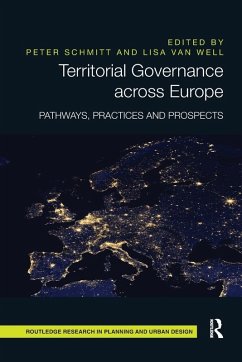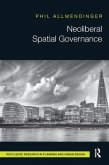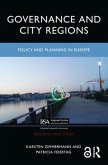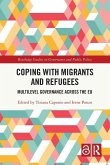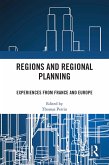This book provides a comprehensive framework for analysing, comparing and promoting territorial governance in policy relevant research. It reveals in-depth considerations of the emergence, state-of-the art and evolution of the concept of territorial governance. A unique series of ten case studies across Europe, from neighbourhood planning in North Shields in the North East of England to climate change adaptation in the Baltic Sea Region, provides far-reaching insights into a number of key elements of territorial governance. The book draws generalised empirically-based conclusions and discusses modes of transferability of 'good practices'. A number of suggestions are presented as to how the main findings from this book can inform theories of territorial governance and spatial policy and planning.
Territorial Governance across Europe will be of considerable interest to scholars around the world who are concerned with European studies, regional policy, urban and regional planning, and human and political geography. It provides a solid debate on discourses, theories, concepts and methods around the notion of territorial governance as well as a number of empirical findings from various contexts across Europe. It specifically targets scholars involved in policy-relevant research.
Territorial Governance across Europe will be of considerable interest to scholars around the world who are concerned with European studies, regional policy, urban and regional planning, and human and political geography. It provides a solid debate on discourses, theories, concepts and methods around the notion of territorial governance as well as a number of empirical findings from various contexts across Europe. It specifically targets scholars involved in policy-relevant research.
'The discussions in this edited volume are at the forefront of the territorial governance debate, as it helps to capture knowledge-related and territorial/place-based elements, which have been overlooked
in other governance-research frameworks. The novelty of the book lies not on trying to define (once again) 'governance' but focuses, instead, on the processes by which actors and institutions at different
levels formulate and implement policies, programmes and projects, in order to achieve - in an efficient, inclusive and sustainable manner - a territorial goal.'
Eduardo Oliveira (2016), Regional Studies
in other governance-research frameworks. The novelty of the book lies not on trying to define (once again) 'governance' but focuses, instead, on the processes by which actors and institutions at different
levels formulate and implement policies, programmes and projects, in order to achieve - in an efficient, inclusive and sustainable manner - a territorial goal.'
Eduardo Oliveira (2016), Regional Studies
'The discussions in this edited volume are at the forefront of the territorial governance debate, as it helps to capture knowledge-related and territorial/place-based elements, which have been overlooked
in other governance-research frameworks. The novelty of the book lies not on trying to define (once again) 'governance' but focuses, instead, on the processes by which actors and institutions at different
levels formulate and implement policies, programmes and projects, in order to achieve - in an efficient, inclusive and sustainable manner - a territorial goal.'
Eduardo Oliveira (2016), Regional Studies
in other governance-research frameworks. The novelty of the book lies not on trying to define (once again) 'governance' but focuses, instead, on the processes by which actors and institutions at different
levels formulate and implement policies, programmes and projects, in order to achieve - in an efficient, inclusive and sustainable manner - a territorial goal.'
Eduardo Oliveira (2016), Regional Studies

